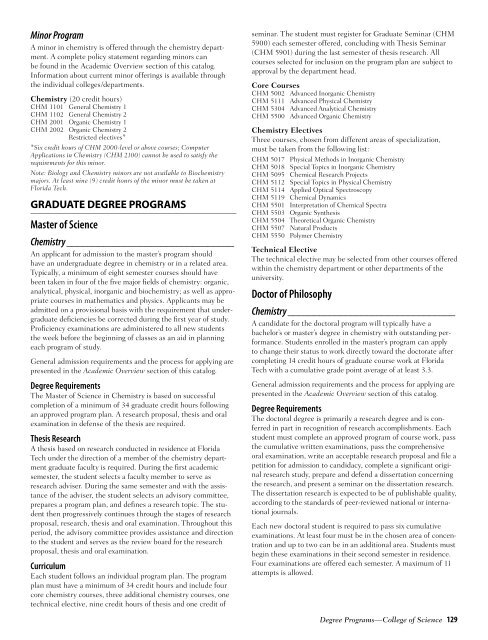2008–2009 - Florida Institute of Technology
2008–2009 - Florida Institute of Technology
2008–2009 - Florida Institute of Technology
Create successful ePaper yourself
Turn your PDF publications into a flip-book with our unique Google optimized e-Paper software.
Minor Program<br />
A minor in chemistry is <strong>of</strong>fered through the chemistry department.<br />
A complete policy statement regarding minors can<br />
be found in the Academic Overview section <strong>of</strong> this catalog.<br />
Information about current minor <strong>of</strong>ferings is available through<br />
the individual colleges/departments.<br />
Chemistry (20 credit hours)<br />
CHM 1101 General Chemistry 1<br />
CHM 1102 General Chemistry 2<br />
CHM 2001 Organic Chemistry 1<br />
CHM 2002 Organic Chemistry 2<br />
Restricted electives*<br />
*Six credit hours <strong>of</strong> CHM 2000-level or above courses; Computer<br />
Applications in Chemistry (CHM 2100) cannot be used to satisfy the<br />
requirements for this minor.<br />
Note: Biology and Chemistry minors are not available to Biochemistry<br />
majors. At least nine (9) credit hours <strong>of</strong> the minor must be taken at<br />
<strong>Florida</strong> Tech.<br />
GraDuate DeGree ProGrams<br />
Master <strong>of</strong> Science<br />
Chemistry ________________________________<br />
An applicant for admission to the master’s program should<br />
have an undergraduate degree in chemistry or in a related area.<br />
Typically, a minimum <strong>of</strong> eight semester courses should have<br />
been taken in four <strong>of</strong> the five major fields <strong>of</strong> chemistry: organic,<br />
analytical, physical, inorganic and biochemistry; as well as appropriate<br />
courses in mathematics and physics. Applicants may be<br />
admitted on a provisional basis with the requirement that undergraduate<br />
deficiencies be corrected during the first year <strong>of</strong> study.<br />
Pr<strong>of</strong>iciency examinations are administered to all new students<br />
the week before the beginning <strong>of</strong> classes as an aid in planning<br />
each program <strong>of</strong> study.<br />
General admission requirements and the process for applying are<br />
presented in the Academic Overview section <strong>of</strong> this catalog.<br />
Degree Requirements<br />
The Master <strong>of</strong> Science in Chemistry is based on successful<br />
completion <strong>of</strong> a minimum <strong>of</strong> 34 graduate credit hours following<br />
an approved program plan. A research proposal, thesis and oral<br />
examination in defense <strong>of</strong> the thesis are required.<br />
Thesis Research<br />
A thesis based on research conducted in residence at <strong>Florida</strong><br />
Tech under the direction <strong>of</strong> a member <strong>of</strong> the chemistry department<br />
graduate faculty is required. During the first academic<br />
semester, the student selects a faculty member to serve as<br />
research adviser. During the same semester and with the assistance<br />
<strong>of</strong> the adviser, the student selects an advisory committee,<br />
prepares a program plan, and defines a research topic. The student<br />
then progressively continues through the stages <strong>of</strong> research<br />
proposal, research, thesis and oral examination. Throughout this<br />
period, the advisory committee provides assistance and direction<br />
to the student and serves as the review board for the research<br />
proposal, thesis and oral examination.<br />
Curriculum<br />
Each student follows an individual program plan. The program<br />
plan must have a minimum <strong>of</strong> 34 credit hours and include four<br />
core chemistry courses, three additional chemistry courses, one<br />
technical elective, nine credit hours <strong>of</strong> thesis and one credit <strong>of</strong><br />
seminar. The student must register for Graduate Seminar (CHM<br />
5900) each semester <strong>of</strong>fered, concluding with Thesis Seminar<br />
(CHM 5901) during the last semester <strong>of</strong> thesis research. All<br />
courses selected for inclusion on the program plan are subject to<br />
approval by the department head.<br />
Core Courses<br />
CHM 5002 Advanced Inorganic Chemistry<br />
CHM 5111 Advanced Physical Chemistry<br />
CHM 5304 Advanced Analytical Chemistry<br />
CHM 5500 Advanced Organic Chemistry<br />
Chemistry Electives<br />
Three courses, chosen from different areas <strong>of</strong> specialization,<br />
must be taken from the following list:<br />
CHM 5017 Physical Methods in Inorganic Chemistry<br />
CHM 5018 Special Topics in Inorganic Chemistry<br />
CHM 5095 Chemical Research Projects<br />
CHM 5112 Special Topics in Physical Chemistry<br />
CHM 5114 Applied Optical Spectroscopy<br />
CHM 5119 Chemical Dynamics<br />
CHM 5501 Interpretation <strong>of</strong> Chemical Spectra<br />
CHM 5503 Organic Synthesis<br />
CHM 5504 Theoretical Organic Chemistry<br />
CHM 5507 Natural Products<br />
CHM 5550 Polymer Chemistry<br />
Technical Elective<br />
The technical elective may be selected from other courses <strong>of</strong>fered<br />
within the chemistry department or other departments <strong>of</strong> the<br />
university.<br />
Doctor <strong>of</strong> Philosophy<br />
Chemistry ________________________________<br />
A candidate for the doctoral program will typically have a<br />
bachelor’s or master’s degree in chemistry with outstanding performance.<br />
Students enrolled in the master’s program can apply<br />
to change their status to work directly toward the doctorate after<br />
completing 14 credit hours <strong>of</strong> graduate course work at <strong>Florida</strong><br />
Tech with a cumulative grade point average <strong>of</strong> at least 3.3.<br />
General admission requirements and the process for applying are<br />
presented in the Academic Overview section <strong>of</strong> this catalog.<br />
Degree Requirements<br />
The doctoral degree is primarily a research degree and is conferred<br />
in part in recognition <strong>of</strong> research accomplishments. Each<br />
student must complete an approved program <strong>of</strong> course work, pass<br />
the cumulative written examinations, pass the comprehensive<br />
oral examination, write an acceptable research proposal and file a<br />
petition for admission to candidacy, complete a significant original<br />
research study, prepare and defend a dissertation concerning<br />
the research, and present a seminar on the dissertation research.<br />
The dissertation research is expected to be <strong>of</strong> publishable quality,<br />
according to the standards <strong>of</strong> peer-reviewed national or international<br />
journals.<br />
Each new doctoral student is required to pass six cumulative<br />
examinations. At least four must be in the chosen area <strong>of</strong> concentration<br />
and up to two can be in an additional area. Students must<br />
begin these examinations in their second semester in residence.<br />
Four examinations are <strong>of</strong>fered each semester. A maximum <strong>of</strong> 11<br />
attempts is allowed.<br />
Degree Programs—College <strong>of</strong> Science 129

















